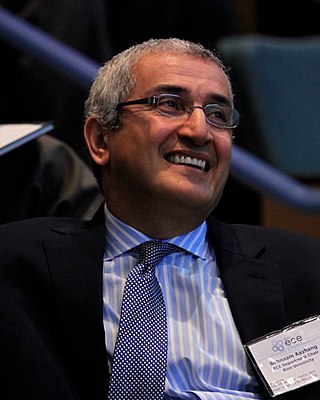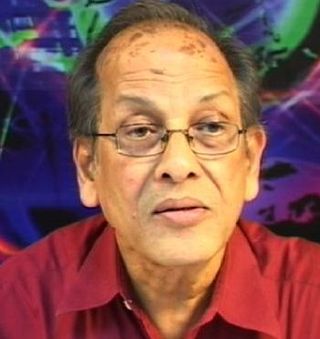Related Research Articles

The School of Computer Science (SCS) at Carnegie Mellon University in Pittsburgh, Pennsylvania, US is a school for computer science established in 1988. It has been consistently ranked among the best computer science programs over the decades. As of 2024 U.S. News & World Report ranks the graduate program as tied for No. 1 with Massachusetts Institute of Technology, Stanford University and University of California, Berkeley.

Jack Joseph Dongarra is an American computer scientist and mathematician. He is a University Distinguished Professor Emeritus of Computer Science in the Electrical Engineering and Computer Science Department at the University of Tennessee. He holds the position of a Distinguished Research Staff member in the Computer Science and Mathematics Division at Oak Ridge National Laboratory, Turing Fellowship in the School of Mathematics at the University of Manchester, and is an adjunct professor and teacher in the Computer Science Department at Rice University. He served as a faculty fellow at the Texas A&M University Institute for Advanced Study (2014–2018). Dongarra is the founding director of the Innovative Computing Laboratory at the University of Tennessee. He was the recipient of the Turing Award in 2021.

The Courant Institute of Mathematical Sciences is the mathematics research school of New York University (NYU). Founded in 1935, it is named after Richard Courant, one of the founders of the Courant Institute and also a mathematics professor at New York University from 1936 to 1972, and serves as a center for research and advanced training in computer science and mathematics. It is located on Gould Plaza next to the Stern School of Business and the economics department of the College of Arts and Science.

David A. Bader is a Distinguished Professor and Director of the Institute for Data Science at the New Jersey Institute of Technology. Previously, he served as the Chair of the Georgia Institute of Technology School of Computational Science & Engineering, where he was also a founding professor, and the executive director of High-Performance Computing at the Georgia Tech College of Computing. In 2007, he was named the first director of the Sony Toshiba IBM Center of Competence for the Cell Processor at Georgia Tech.

Shih Choon Fong is a Singaporean college administrator and fracture mechanics expert who served as the founding president of the King Abdullah University of Science and Technology (KAUST) between 2008 and 2013. Prior joining KAUST as its founding president, he was the president of the National University of Singapore (NUS) for nine years and has been widely acknowledged for creating the university's research-intensive focus with an entrepreneurial dimension, as well as for NUS' elevated global reputation. Drawing from his experiences abroad, Shih institutionalised a performance- and market-based evaluation and compensation system for academics.
John Emory Dennis, Jr. is an American mathematician who has made major contributions in mathematical optimization. Dennis is currently a Noah Harding professor emeritus and research professor in the department of computational and applied mathematics at Rice University in Houston, Texas. His research interests include optimization in engineering design. He is the founder and editor-in-chief of the SIAM Journal on Optimization. In 2010, he was elected a Fellow of the Society for Industrial and Applied Mathematics.
Vasant G. Honavar is an Indian-American computer scientist, and artificial intelligence, machine learning, big data, data science, causal inference, knowledge representation, bioinformatics and health informatics researcher and professor.

David Arthur Eppstein is an American computer scientist and mathematician. He is a distinguished professor of computer science at the University of California, Irvine. He is known for his work in computational geometry, graph algorithms, and recreational mathematics. In 2011, he was named an ACM Fellow.
Charles Francis Van Loan is an emeritus professor of computer science and the Joseph C. Ford Professor of Engineering at Cornell University, He is known for his expertise in numerical analysis, especially matrix computations.
Kalyanmoy Deb is an Indian computer scientist. Deb is the Herman E. & Ruth J. Koenig Endowed Chair Professor in the Department of Electrical and Computing Engineering at Michigan State University. Deb is also a professor in the Department of Computer Science and Engineering and the Department of Mechanical Engineering at Michigan State University.
John Tinsley Oden was an American engineer. He was the Associate Vice President for Research, the Cockrell Family Regents' Chair in Engineering #2, the Peter O'Donnell, Jr. Centennial Chair in Computing Systems, a Professor of Aerospace Engineering and Engineering Mechanics, a Professor of Mathematics, and a Professor of Computer Science at The University of Texas at Austin. Oden has been listed as an ISI Highly Cited Author in Engineering by the ISI Web of Knowledge, Thomson Scientific Company.

Moshe Ya'akov Vardi is an Israeli theoretical computer scientist. He is the Karen Ostrum George Distinguished Service Professor in Computational Engineering at Rice University, United States. and a faculty advisor for the Ken Kennedy Institute. His interests focus on applications of logic to computer science, including database theory, finite model theory, knowledge of multi-agent systems, computer-aided verification and reasoning, and teaching logic across the curriculum. He is an expert in model checking, constraint satisfaction and database theory, common knowledge (logic), and theoretical computer science.
David Paul Dobkin is an American computer scientist and the Phillip Y. Goldman '86 Professor of Computer Science at Princeton University. His research has concerned computational geometry and computer graphics.
Robert Lee Constable is an American computer scientist. He is a professor of computer science and first and former dean of the Faculty of Computing and Information Science at Cornell University. He is known for his work on connecting computer programs and mathematical proofs, especially the Nuprl system. Prior to Nuprl, he worked on the PL/CV formal system and verifier. Alonzo Church supervised Constable's junior thesis while he was studying in Princeton. Constable received his PhD in 1968 under Stephen Kleene and has supervised over 40 students.
Bir Bhanu is the Marlan and Rosemary Bourns Endowed University of California Presidential Chair in Engineering, the Distinguished Professor of Electrical and Computer Engineering, and Cooperative Professor of Computer Science and Engineering, Mechanical Engineering and Bioengineering, at the Marlan and Rosemary Bourns College of Engineering at the University of California, Riverside (UCR). He is the first Founding Faculty of the Marlan and Rosemary Bourns College of Engineering at UCR and served as the Founding Chair of Electrical Engineering from 1/1991 to 6/1994 and the Founding Director of the Center for Research in Intelligent Systems (CRIS) from 4/1998 to 6/2019. He has been the director of Visualization and Intelligent Systems Laboratory (VISLab) at UCR since 1991. He was the Interim Chair of the Department of Bioengineering at UCR from 7/2014 to 6/2016. Additionally, he has been the Director of the NSF Integrative Graduate Education, Research and Training (IGERT) program in Video Bioinformatics at UC Riverside. Dr. Bhanu has been the principal investigator of various programs for NSF, DARPA, NASA, AFOSR, ONR, ARO and other agencies and industries in the areas of object/target recognition, learning and vision, image/video understanding, image/video databases with applications in security, defense, intelligence, biological and medical imaging and analysis, biometrics, autonomous navigation and industrial machine vision.

Behnaam Aazhang is the J.S. Abercrombie Professor in Electrical and Computer Engineering at Rice University and Director of the Rice Neuroengineering Initiative.

Tarun Kant, an institute chair professor at the Indian Institute of Technology Bombay in Mumbai since December 2009, was born on 1 July 1946 in Ballia, Uttar Pradesh, India. He received a BSc degree from Allahabad University in 1962, a B.Tech (Hons.) degree in civil engineering from IIT Bombay in 1967 and an M.Tech in civil engineering, specializing in structural engineering, from the Indian Institute of Technology Kanpur in 1969. Kant spent about 18 months at a consulting engineering firm in Mumbai before becoming a lecturer at IIT Bombay in January 1971. He received a PhD degree in 1977. Kant became an assistant professor in 1978 and a professor in 1986. At IIT Bombay, he has been a department head (2000–2002), dean of planning (2001–2003) and chair of the Joint Entrance Examination (1998) and the Central Library (1995–1999).
Luay K. Nakhleh (Arabic): لؤي نخله; born May 8, 1974) is a Palestinian-Israeli-American computer scientist and computational biologist who is the William and Stephanie Sick Dean of the George R. Brown School of Engineering, a professor of Computer Science and a professor of BioSciences at Rice University in Houston, Texas.

Rory A. Cooper is an American bioengineer who currently serves as FISA/PVA Distinguished Professor, Past Chair, in the Department of Rehabilitation Science and Technology and professor of bioengineering, physical medicine and rehabilitation, and orthopedic surgery at the University of Pittsburgh. He is also assistant vice chancellor for research for STEM and Health Sciences Collaboration, and a National Medal of Technology and Innovation Laureate. He holds an adjunct faculty position at the Robotics Institute of Carnegie Mellon University, and is an invited professor at Xi'an Jiaotong University in Xi'an, China.
Keith A. Crandall is an American computational biologist, bioinformaticist, and population geneticist at George Washington University, where he is the founding director of the Computational Biology Institute, and professor in the Department of Biostatistics and Bioinformatics.
References
- ↑ "Keith D. Cooper". rice.edu. Retrieved December 13, 2016.
- ↑ "Faculty". rice.edu. Retrieved December 13, 2016.
- ↑ "Keith D. Cooper" . Retrieved December 13, 2016.
- ↑ "Cooper, Keith D." worldcat.org. Retrieved December 13, 2016.
- ↑ "Keith Cooper named CAAM chair". engineering.rice.edu. Retrieved January 18, 2020.
- ↑ https://profiles.rice.edu/faculty/keith-d-cooper